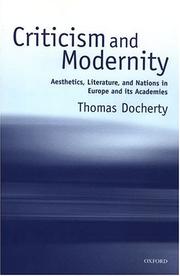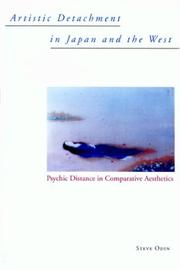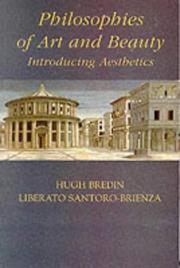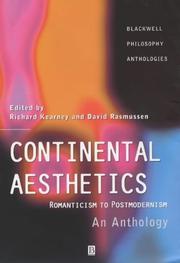| Listing 1 - 10 of 17 | << page >> |
Sort by
|

ISBN: 0198185014 Year: 1999 Publisher: Oxford New York Clarendon Press Oxford University Press
Abstract | Keywords | Export | Availability | Bookmark
 Loading...
Loading...Choose an application
- Reference Manager
- EndNote
- RefWorks (Direct export to RefWorks)
Book
ISBN: 9781783482122 9781783482115 Year: 2016 Publisher: London ; New York : Rowman & Littlefield International,
Abstract | Keywords | Export | Availability | Bookmark
 Loading...
Loading...Choose an application
- Reference Manager
- EndNote
- RefWorks (Direct export to RefWorks)
Aesthetics, European --- Aesthetics, Modern --- Aesthetics --- History

ISBN: 0824823745 Year: 2001 Publisher: Honolulu (Hawaii) : University of Hawaii press,
Abstract | Keywords | Export | Availability | Bookmark
 Loading...
Loading...Choose an application
- Reference Manager
- EndNote
- RefWorks (Direct export to RefWorks)
Aesthetics, Comparative. --- Aesthetics, European. --- Aesthetics, Japanese.

ISBN: 0748611916 9780748611911 1474465390 Year: 2000 Publisher: Edinburgh University Press
Abstract | Keywords | Export | Availability | Bookmark
 Loading...
Loading...Choose an application
- Reference Manager
- EndNote
- RefWorks (Direct export to RefWorks)
Aesthetics, European. --- Arts, European --- Philosophy. --- Arts, European - Philosophy.
Book
ISBN: 2738198104 Year: 2010 Publisher: Odile Jacob
Abstract | Keywords | Export | Availability | Bookmark
 Loading...
Loading...Choose an application
- Reference Manager
- EndNote
- RefWorks (Direct export to RefWorks)
A l'aube du XVIIIe siecle, le laboratoire de l'historien d'art est acheve. L'emergence des nouveaux outils va transformer radicalement le regard et faciliter une separation claire, au sein de l'A uvre d'art, entre ses composantes : d'un cote, l'image immaterielle qu'elle degage, de l'autre, le support materiel qui la rend tangible. Cette scission a ete travaillee tout au long du siecle. On peut dire sans exagerer qu'elle constitue l'evenement le plus important, quoique le plus ignore, qui fonde notre modernite. Dans ce livre, je tente de dessiner le nouvel objet scientifique qui emerge dans les cabinets, les collections publiques et privees ; j'evoque les grands instruments forges par le siecle des Lumieres et les protocoles de leur usage. L'histoire de l'art, comme l'histoire des sciences, devrait accorder une importance accrue aux dispositifs qui lui permettent de creer des experiences, d'en tirer des hypotheses, enfin de les deposer dans un support adequat selon des modalites originales. P. G. Pascal Griener est professeur d'histoire de l'art a l'Universite de Neuchatel.
Art --- Art, European --- Aesthetics, European --- Art and philosophy --- Philosophy --- History
Book
ISBN: 1782843450 1782843434 9781782843436 9781782843450 9781782843450 9781845197445 1845197445 Year: 2016 Publisher: Brighton
Abstract | Keywords | Export | Availability | Bookmark
 Loading...
Loading...Choose an application
- Reference Manager
- EndNote
- RefWorks (Direct export to RefWorks)
"Originally published in Dutch and translated to Spanish for the fourth centenary celebration of the death of El Greco in 2014, this book is a comprehensive study of the rediscovery of El Greco - seen as one of the most important events of its kind in art history. The Nationalization of Culture versus the Rise of Modern Art analyzes how changes in artistic taste in the second half of the nineteenth century caused a profound revision of the place of El Greco in the artistic canon. This study examines the work of painters, art critics, writers, scholars and philosophers from France, Germany and Spain, and the role of exhibitions, auctions, monuments and commemorations. Paintings and associated anecdotes are discussed, and historical debates such as El Greco's supposed astigmatism are addressed in a highly readable and engaging style. This book will be of interest to both specialists and the interested art public"-- "Originally published in Dutch and translated to Spanish for the fourth centenary celebration of the death of El Greco in 2014, this book is a comprehensive study of the rediscovery of El Greco - seen as one of the most important events of its kind in art history. The Nationalization of Culture versus the Rise of Modern Art analyzes how changes in artistic taste in the second half of the nineteenth century caused a profound revision of the place of El Greco in the artistic canon. As a result, El Greco was transformed from an extravagant outsider and a secondary painter into the founder of the Spanish School and one of the principle predecessors of modern art, increasingly related to that of the Impressionists - due primarily to the German critic Julius Meier-Graefe's influential History of Modern Art (1914). This shift in artistic preference has been attributed to the rise of modern art but Eric Storm, a cultural historian, shows that in the case of El Greco nationalist motives were even more important. This study examines the work of painters, art critics, writers, scholars and philosophers from France, Germany and Spain, and the role of exhibitions, auctions, monuments and commemorations. Paintings and associated anecdotes are discussed, and historical debates such as El Greco's supposed astigmatism are addressed in a highly readable and engaging style. This book will be of interest to both specialists and the interested art public"--
Aesthetics, European --- Nationalism and art --- History --- Greco, --- Criticism and interpretation.
Book
ISBN: 0395172209 Year: 1973 Publisher: Boston : Houghton Mifflin,
Abstract | Keywords | Export | Availability | Bookmark
 Loading...
Loading...Choose an application
- Reference Manager
- EndNote
- RefWorks (Direct export to RefWorks)
Aesthetics, European. --- Courts and courtiers --- Festivals --- Pageants --- Renaissance. --- Spectacular, The. --- History. --- Europe --- Kings and rulers.
Book
ISBN: 9461660952 9789461660954 9789058677341 9058677346 Year: 2009 Publisher: Leuven
Abstract | Keywords | Export | Availability | Bookmark
 Loading...
Loading...Choose an application
- Reference Manager
- EndNote
- RefWorks (Direct export to RefWorks)
New Paths, the seventh volume in the Writings of the Orpheus Institute, is a result of the third International Orpheus Academy for Music Theory. Five renowned scholars discuss a variety of topics related to romanticism, focusing especially on the years 1800-1840. In a much-needed historical and critical overview of the concept of organicism, John Neubauer ranges from its origins in Enlightenment biology to its aftermath in postmodernism. Janet Schmalfeldt shows that Beethoven's op.47 not only should be called the Bridgetower rather than the Kreutzer Sonata, but also that this makes a difference as to its meaning. Extreme contrasts between emotional and mechanical types of music in late Beethoven are explained by Scott Burnham as stagings of the limits of human subjectivity. Jim Samson discusses Chopin's little-known musical upbringing in Warsaw, arguing that his grounding in eighteenth-century aesthetics (as opposed to theory) has thus far been neglected. Finally, Susan Youens' case study of Franz Lachner's Heine songs sheds new light on radical experimentation by a so-called epigone in the period between Schubert and Schumann's miracle song year.
Aesthetics, European --- Music theory --- Music --- Musical theory --- Theory of music --- History --- History and criticism. --- Theory --- History and criticism
Book
ISBN: 0813939046 9780813939032 0813939038 9780813939049 Year: 2016 Publisher: Charlottesville, Virginia
Abstract | Keywords | Export | Availability | Bookmark
 Loading...
Loading...Choose an application
- Reference Manager
- EndNote
- RefWorks (Direct export to RefWorks)
Schweighauser argues that deception in and through early American art constitutes a comment on eighteenth-century debates concerning the nature and function of art as much as it responds to shifts in social and political organization.
Aesthetics, European. --- Aesthetics, American. --- Deception in literature. --- Aesthetics in literature. --- American fiction --- American aesthetics --- European aesthetics --- History and criticism.

ISBN: 0631216103 0631216111 Year: 2001 Volume: 12 Publisher: Oxford Blackwell
Abstract | Keywords | Export | Availability | Bookmark
 Loading...
Loading...Choose an application
- Reference Manager
- EndNote
- RefWorks (Direct export to RefWorks)
Aesthetics [European ] --- Aesthetics [Modern ] --- Esthetica (Moderne filosofie) --- Esthetica [Europese ] --- Esthetica [Moderne ] --- Esthétique (Philosophie moderne) --- Esthétique européenne --- Esthétique moderne --- Modern aesthetics --- Moderne esthetica --- 111.85 --- Metafysica: schoonheid; metafysische esthetica --- Aesthetics, European. --- Aesthetics, Modern. --- 111.85 Metafysica: schoonheid; metafysische esthetica --- Aesthetics, European --- Aesthetics, Modern --- European aesthetics
| Listing 1 - 10 of 17 | << page >> |
Sort by
|

 Search
Search Feedback
Feedback About UniCat
About UniCat  Help
Help News
News